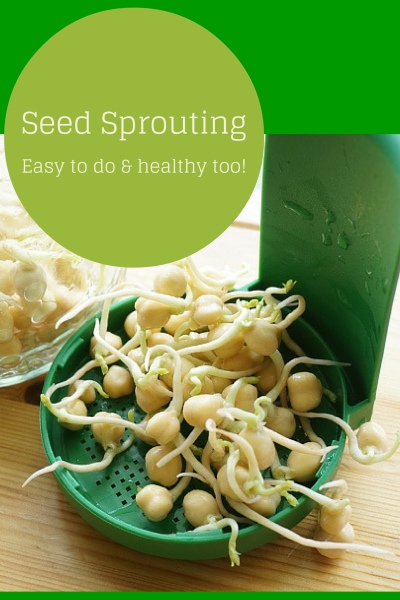 Easily Grow Fresh, Sprouts and Micro-greens in a Glass Jar Germinator
Easily Grow Fresh, Sprouts and Micro-greens in a Glass Jar Germinator
Sprouting your own organic seeds is fun, simple, cheap, quick, tasty and easy to do. It provides you with super healthy, super fresh, tasty sprouts and micro greens within just a few days. Learn how to easily grow fresh, Sprouts and Micro-greens in a Glass Jar Germinator
See –The Health Benefits Of Organic Sprouts & Micro Greens – Eating Bio-Genic Foods For Health
Seed Sprouting at home is a lot more environmentally friendly than buying store bought sprouts, that are often packaged in plastic punnets!
Getting The Kids Involved In Growing Sprouts.
My kids and I began our own sprouting experiment with the help of the team of organic gardening experts at Green Harvest.
We ordered a couple of their A. Vogel bioSnaky Original Glass Jar Germinators and a few packs of organic sprouting seeds – Fenugreek, Mung Beans, Alfalfa, Chickpea, Broccoli, Radish and Sunflower Micro-greens.
The reason for choosing to use the glass jars, rather than a larger germinator ,was because they are made only out of glass and have a safe, inert, polypropylene plastic lid.
Getting young children involved in seed sprouting and growing micro-greens is a great way to show them, in a very quick time frame, how plant food grows.
I gave each child their own jar and we started our first organic sprouting experiment using organic Mung Beans, as these are tasty and I was pretty sure the kids would enjoy crunching away on their very own produce!
Word Of Warning – Grow Sprouts Safely
Salmonella, Listeria and E.Coli , the bacterias that cause food poisoning, love the moist conditions needed to grow micro-greens and sprouts in. If the seeds you start with are even slightly contaminated with any of these bugs, then the wet and warm conditions inside your seed germinator, will see these bugs quickly multiplying and can make you very ill.
That being said the risk of contaminated sprouting seed is low. But if young children, pregnant women, elderly people, or people with a compromised immune system are eating sprouts and micro-greens it is best they are cooked thoroughly and not eaten raw.
The growers together with government bodies are working to ensure that the sprouts they sell are uncontaminated with these bacterium. Read more here at Food Safety Gov – Sprouts What You Should Know.
Buying from reputable organic seed suppliers, such as Green Harvest and actually making sure the seeds you buy are specifically for sprouting, will go along was toward minimizing food poisoning risks.
Step by Step Guide On How To Sprout Seed In A Glass Jar Germinator.
Step 1. First wash your jar sprouter thoroughly with very hot water and a natural dish-washing detergent. We also like to rinse with vinegar and then hot water.
Step 2. Put a couple teaspoons or 1 tablespoon of smaller seed, or 1/2 a cup of bigger seeds into your glass sprouter jar, fill to the top with fresh water, shake lightly and drain out the water. Repeat the process.
Step 3. Refill the jar so that the seeds are covered with filtered room temperature water. Make sure the seeds are covered with water which is two to three times their depth. Then screw on the mesh polypropylene lid, stand the jar upright and let the seeds soak for the required amount of time. Some seeds need a couple hours, while some need up to 8 hours. It is important to soak as outlined on the packet.
Your sprout jar should be placed in a place that gets good natural light, but not direct sunlight.
Step 4. After the soaking period is finished, rinse and drain the seeds in fresh water a couple of times and then invert the jar so that it is sitting on it’s angled stand to let the water drain and air flow better.
Step 5. Rinse and drain the seeds morning and evening each day with fresh water until they have fully sprouted.
Safety & Tips For Seed Sprouting & Growing Micro-Greens
- Sprouts should be eaten before the secondary leaves appear.
- You can harvest them at any time from when the shoots start to grow out of the seed.
- Rinse sprouts thoroughly before storing or eating them.
- Storing sprouts – your sprouts should be rinsed and drained well and then stored in an air-tight container in the fridge. Rinse and drain to keep them fresh every couple of days and I would recommend rinsing and draining each time you go to eat them.
- On hot days when sprouting rinse more often.
- If your are not home on hot days to rinse, store your jar of sprouts in the fridge and rinse when you get home in the evening.
- If your sprouts are slimy, moldy, or smell off DO NOT EAT!
- Always try to sprout certified organic seeds.
For more in-depth tips and information on sprouting see Green Harvest Sprouting Guide.
Before you leave, if you enjoyed this article sign up to LivingSafe and stay informed! LivingSafe helping you live healthier & safer.
How To Start Your Own Organic Veggie Patch
Why Organic Food Really is Healthier.
Health Benefits Of Chlorophyll & Green Super Foods
The Health Benefits of Activated Nuts &How To Activate Nuts
How To Live A Cruelty Free Lifestyle Checklist
Dehydrated Food Health Benefits & How To Use A Food Dehydrator
Eating Meat The Unhealthy Truth
Leave a Reply
You must be logged in to post a comment.